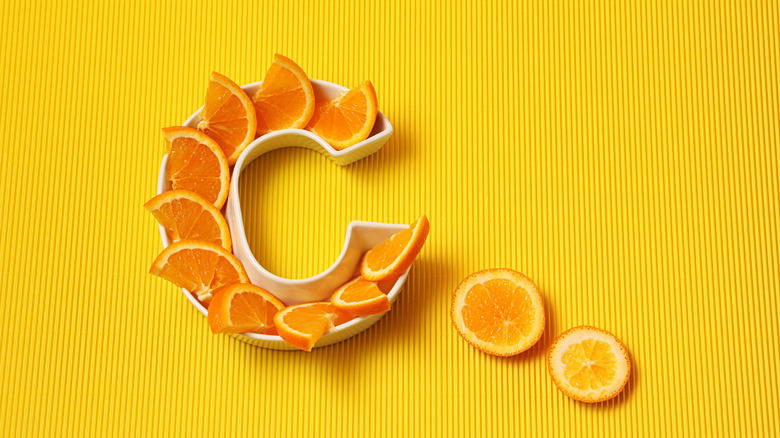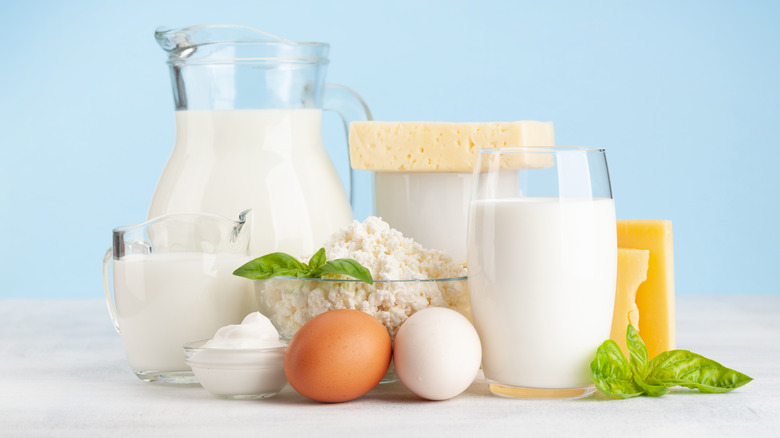The Surprising Vitamin That Can Help Your Iron Levels
When it comes to essential nutrients, iron can be one of the most difficult minerals to get enough of in your diet. In fact, iron deficiency commonly causes anemia, affecting approximately a billion people globally, according to Heathline. Given the prevalence of iron deficiency, it's important to make certain that the iron you consume is being properly absorbed by your body.
There are two forms of dietary iron humans consume: heme and non-heme (via Harvard T.H. Chan School of Public Health). Heme iron comes from animal sources such as meat and seafood, whereas non-heme iron comes from plant sources such as greens, seeds, nuts, whole grains, and sometimes even from animal sources when the animal has consumed non-heme iron through their diet. The human body tends to absorb heme iron better than it absorbs non-heme iron, so it is important to pair sources of non-heme iron with vitamins that can help with absorption. One way to increase the absorption of iron is by taking vitamin C at the same time as you consume sources of iron.
Benefits of vitamin C
Vitamin C is often recommended when someone is feeling sick or wants to boost their immune system. In addition to helping you stay healthy, vitamin C can help your body absorb iron by increasing the amount of the vitamin your body takes in through transferrin, the protein that carries iron to where it is needed in the body (via MBG Health). It's important to note that the human body cannot derive vitamin C from within itself, so it's necessary to consume it through foods and beverages.
When you think about vitamin C, you may conjure up an image of orange juice or tangy citrus fruits, which are definitely excellent sources of vitamin C. In addition to citrus, vitamin C can be found in many other foods that may surprise you. Foods containing vitamin C include strawberries, kiwifruits, tomatoes, broccoli, bell peppers, and even white potatoes (per Harvard T.H. Chan School of Public Health). Another easy way to incorporate more vitamin C into your diet is to squeeze lemon juice into your water or over your food when you sit down for a meal (via Healthline). You can take a vitamin C supplement tablet, but since many supplements are not regulated and the quality of supplements on the market can vastly vary, you should always check with your doctor to determine which specific supplements are right for you.
Nutrients that inhibit iron absorption
While bolstering vitamin C can help with iron absorption, other nutrients, like calcium, may actually inhibit it. Calcium is a vitamin that can strengthen your bones, but some studies have suggested that it can also decrease the amount of iron your body absorbs if the two nutrients are consumed at the same time, reports Active Iron.
When it comes to your breakfast table, your orange juice and omelet may be at odds with one another. You may be surprised to learn that eggs can inhibit iron absorption because they have a protein called phosvitin which causes the molecules of iron to stick together, thus making it increasingly difficult for your body to absorb (via Livestrong). Your morning mocha may also decrease the amount of iron you absorb since coffee, as well as chocolate, may contain polyphenols, according to Medical News Today. Polyphenols are organic compounds that can help fight disease and provide health benefits, but unfortunately, boosting iron absorption isn't one of them (per Livestrong).
There are also prescription medications that can interfere with iron absorption, as well as medications that are hindered by consuming iron (via St Luke's Hospital). Always consult with your healthcare provider before adding or removing supplements to your health regimen so that you can be aware of how each supplement may interact with the medication you take and impact your overall health.



